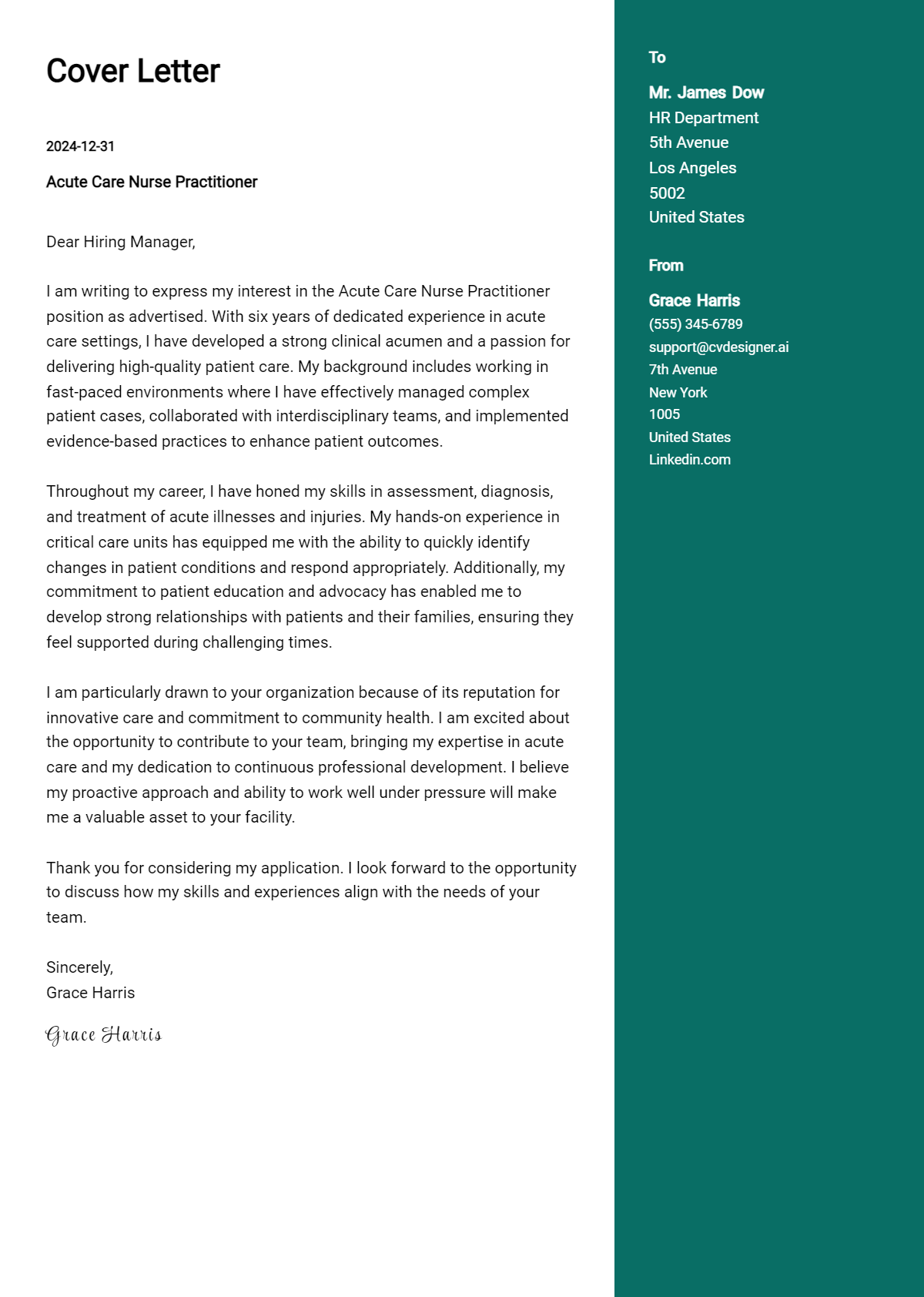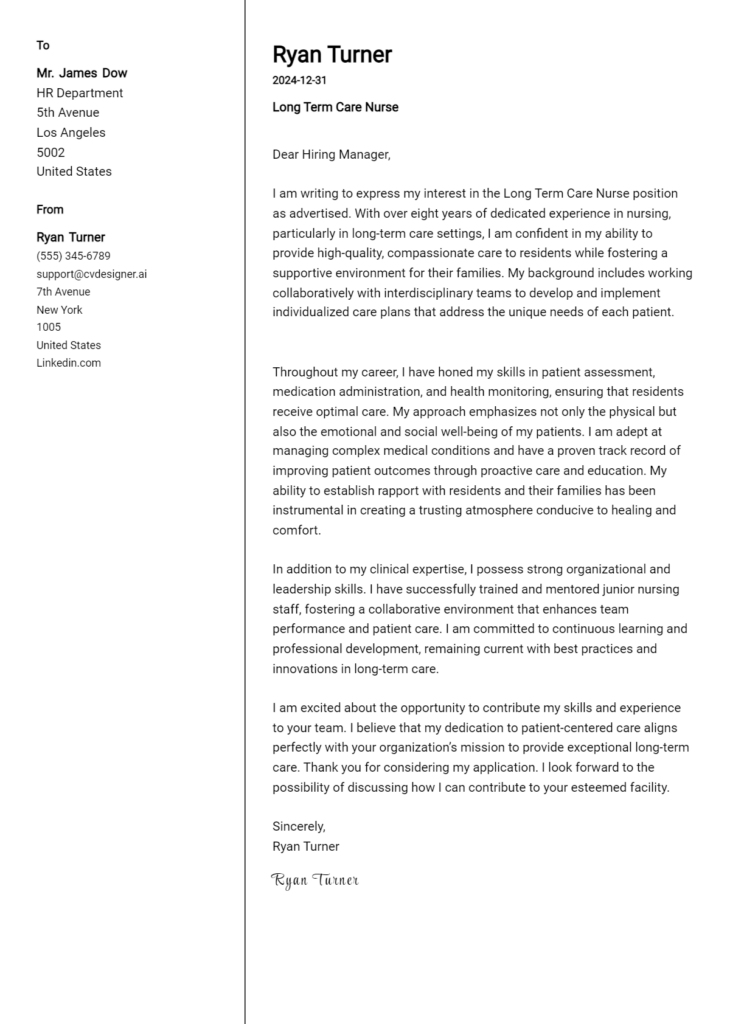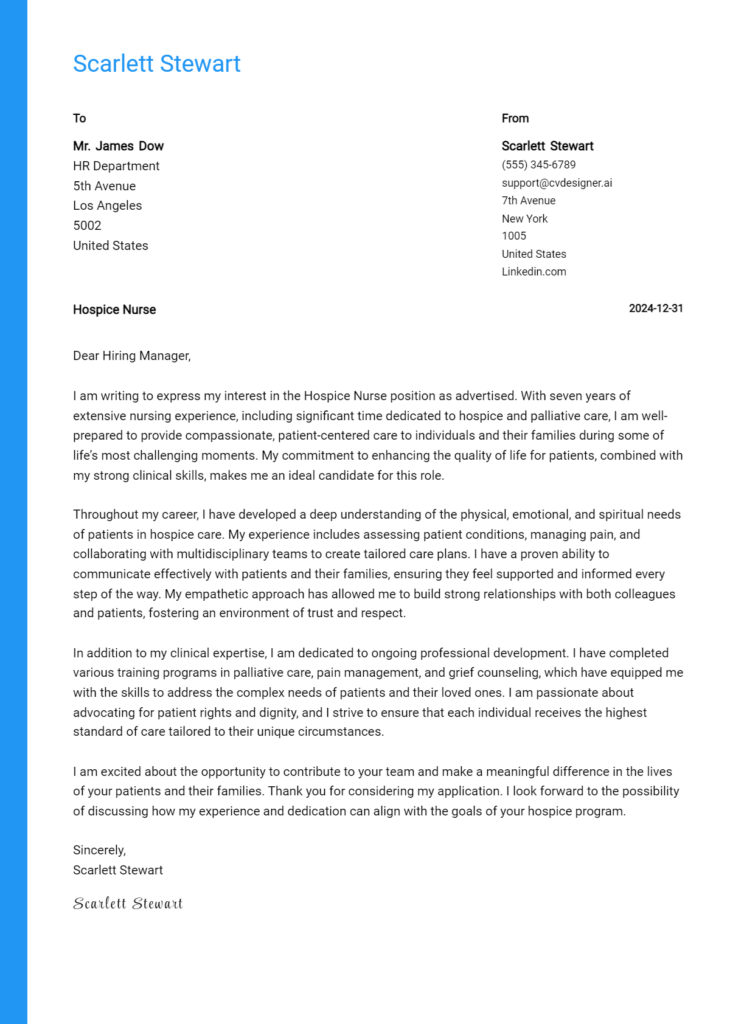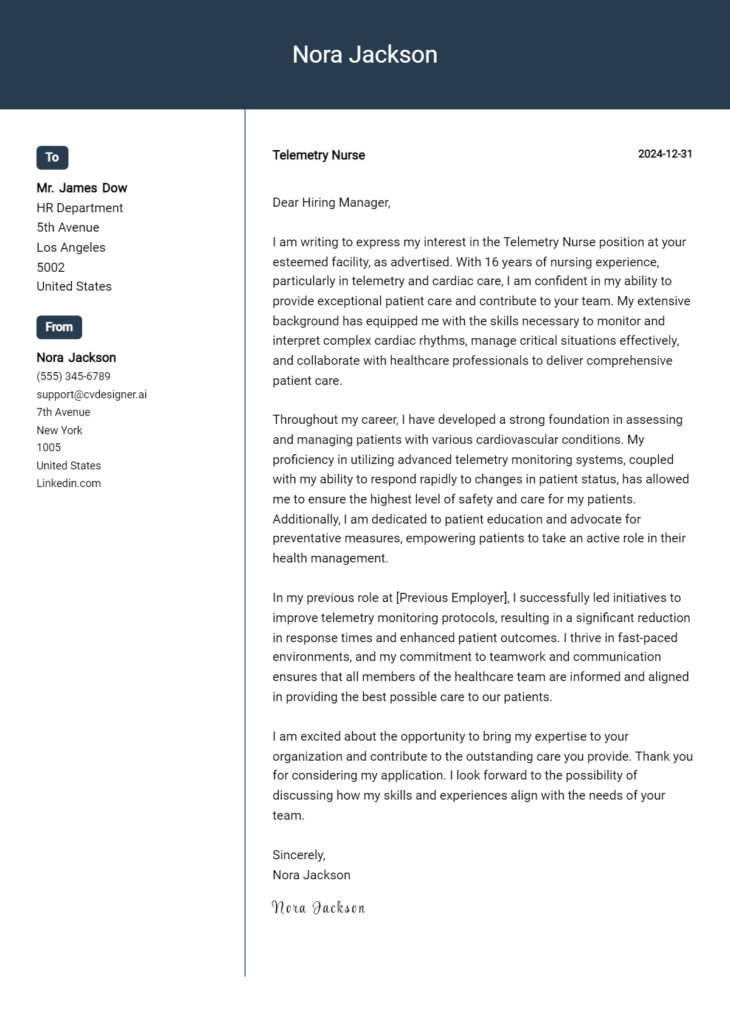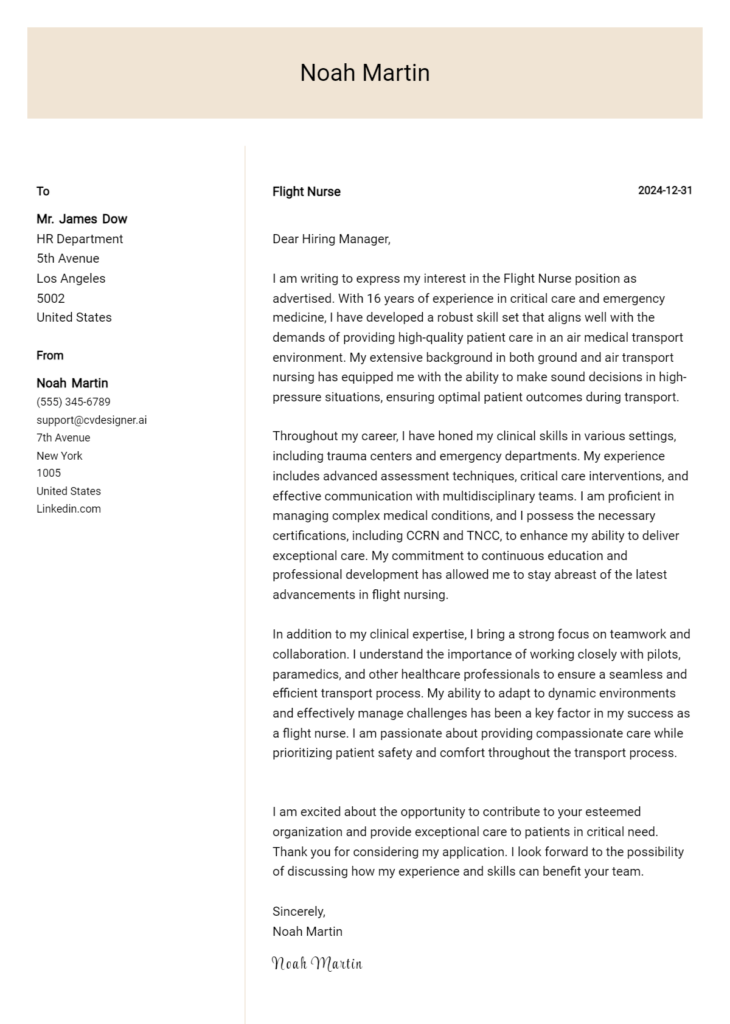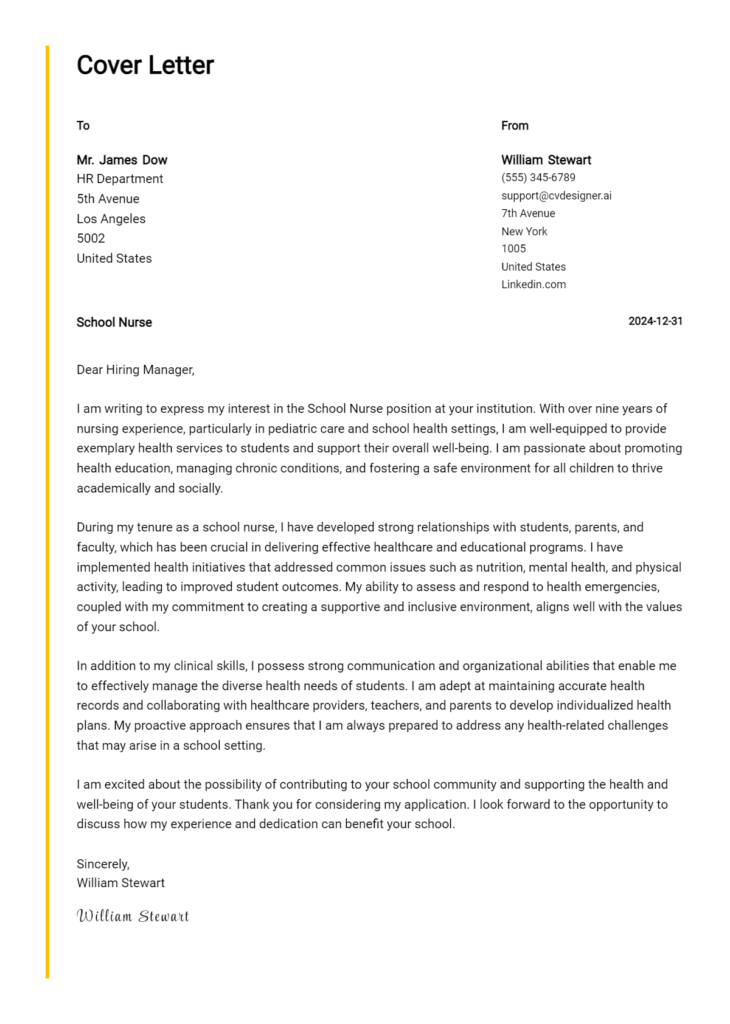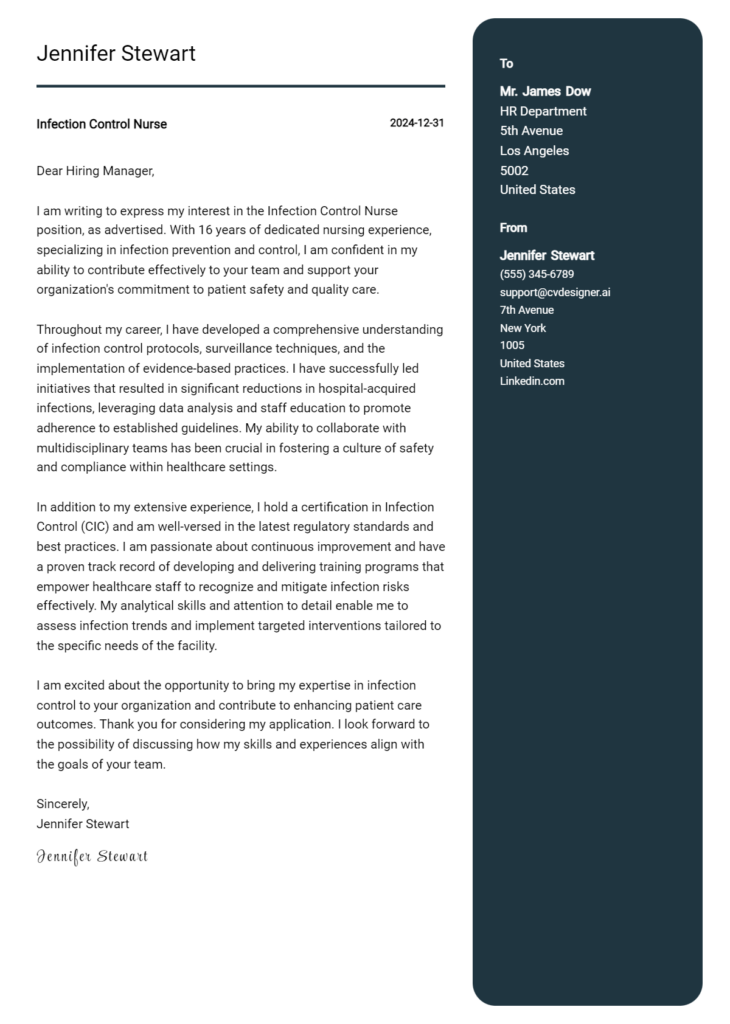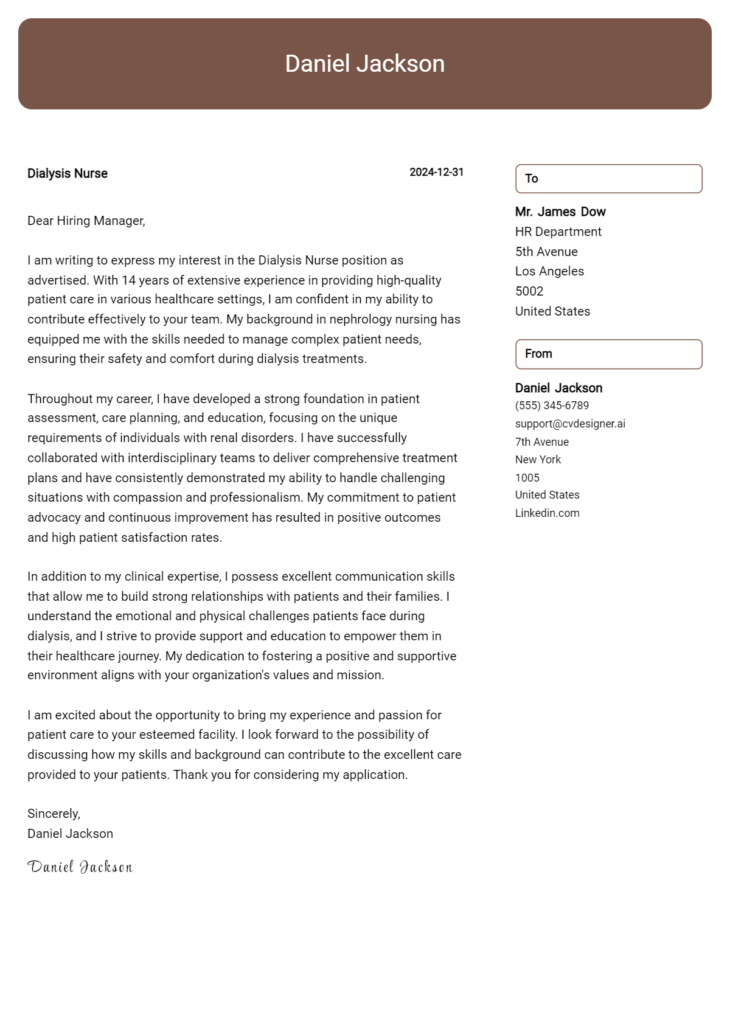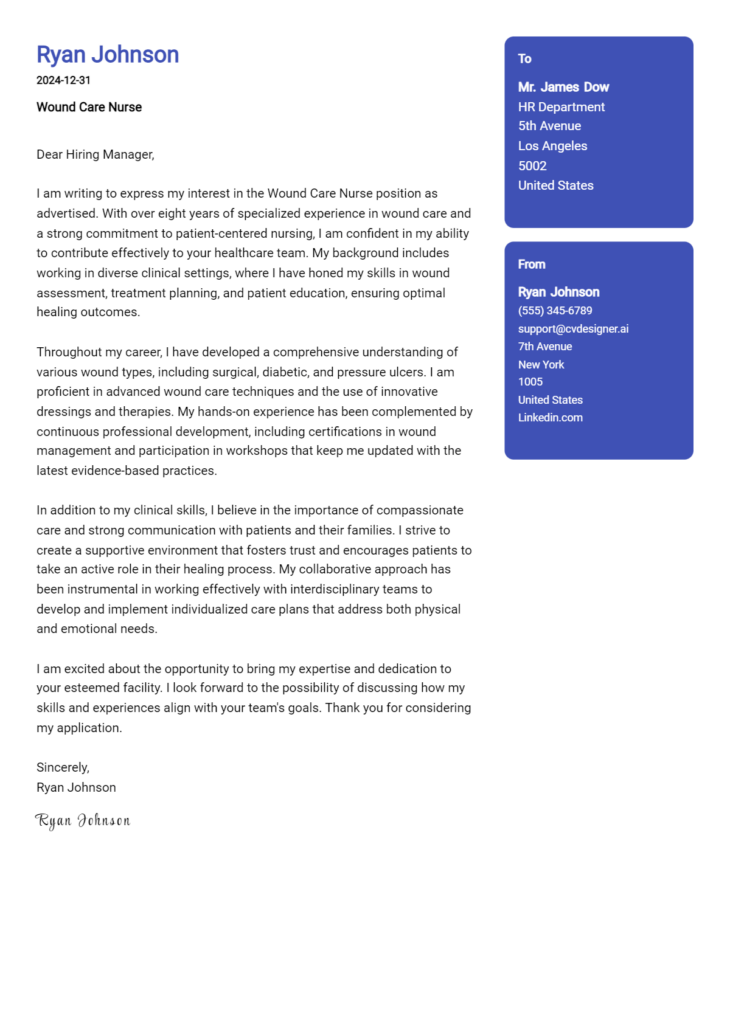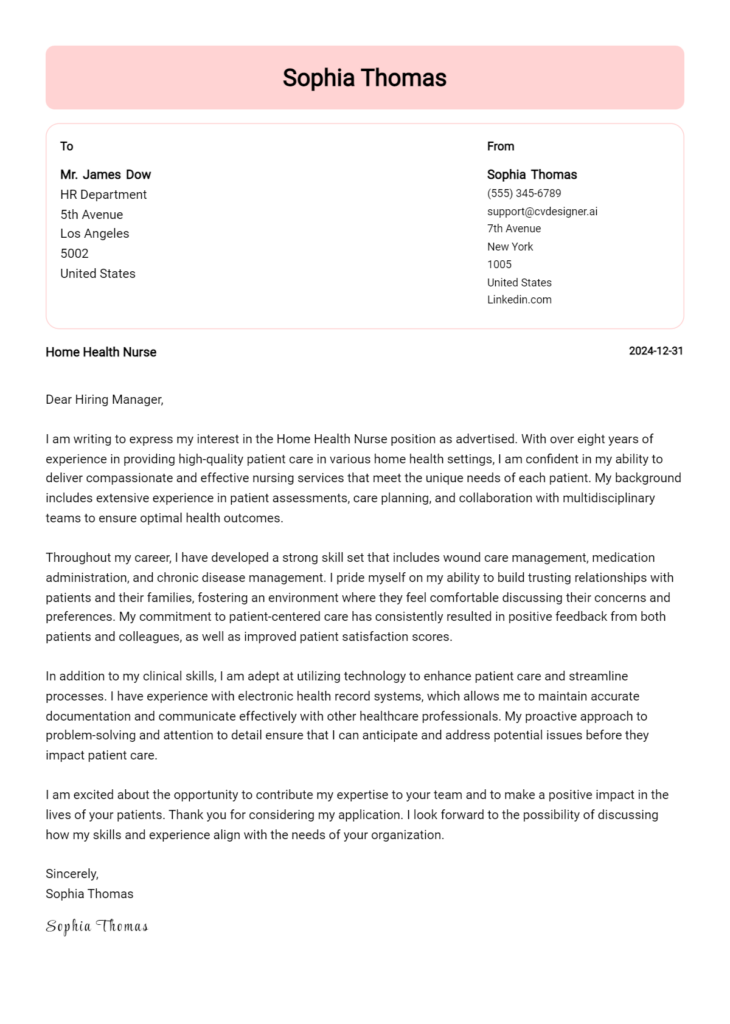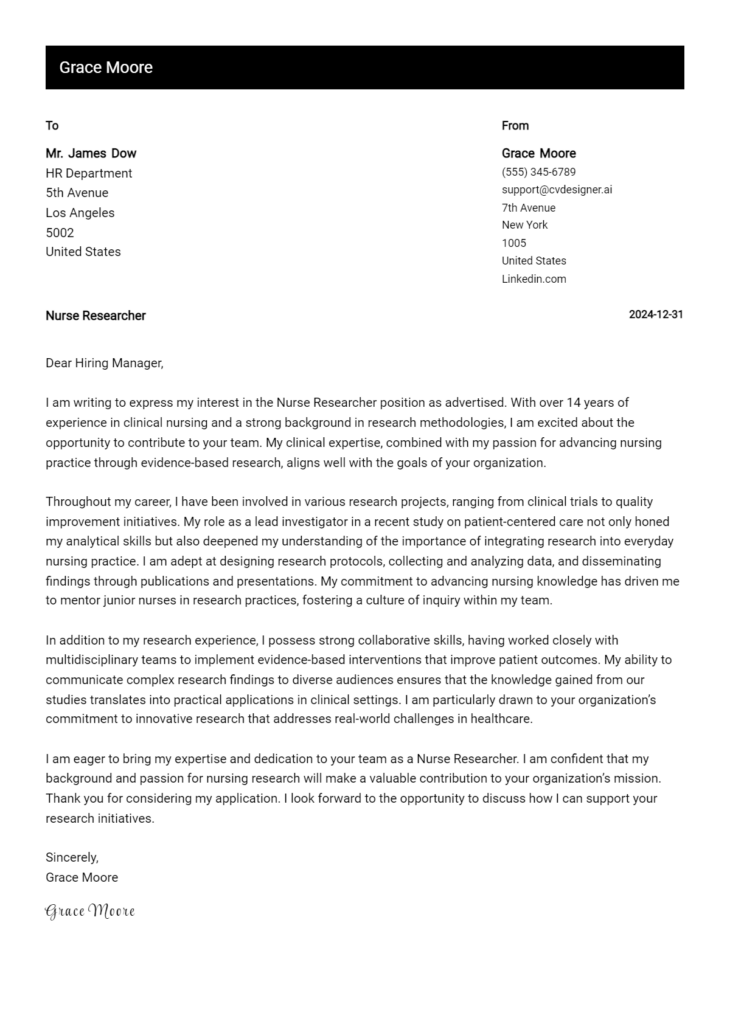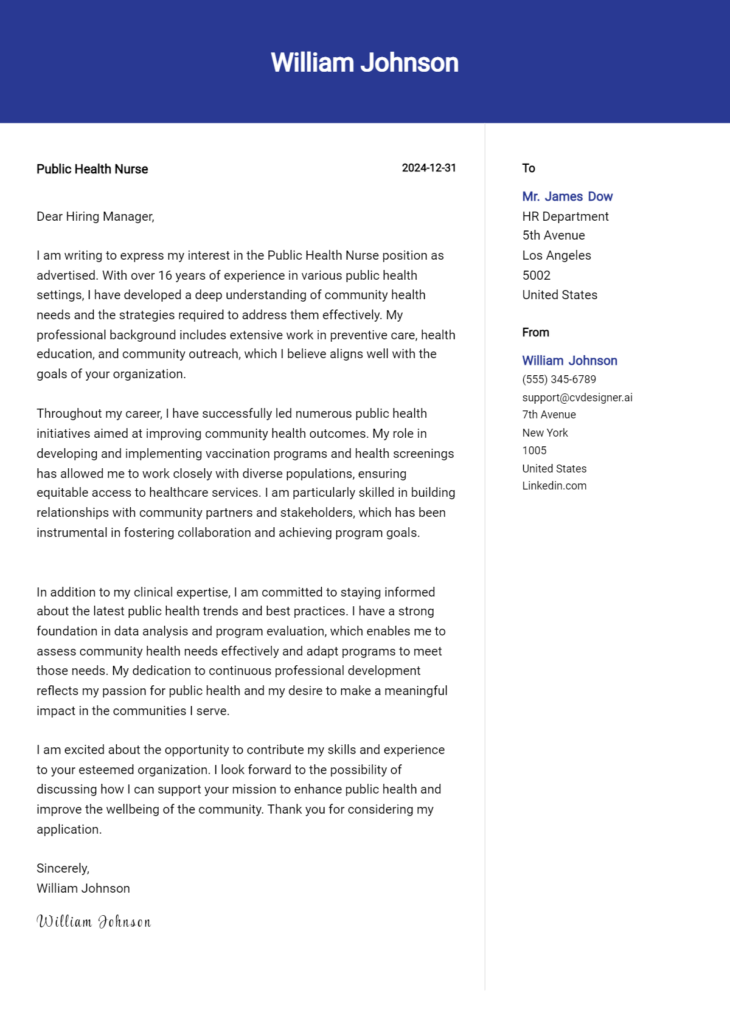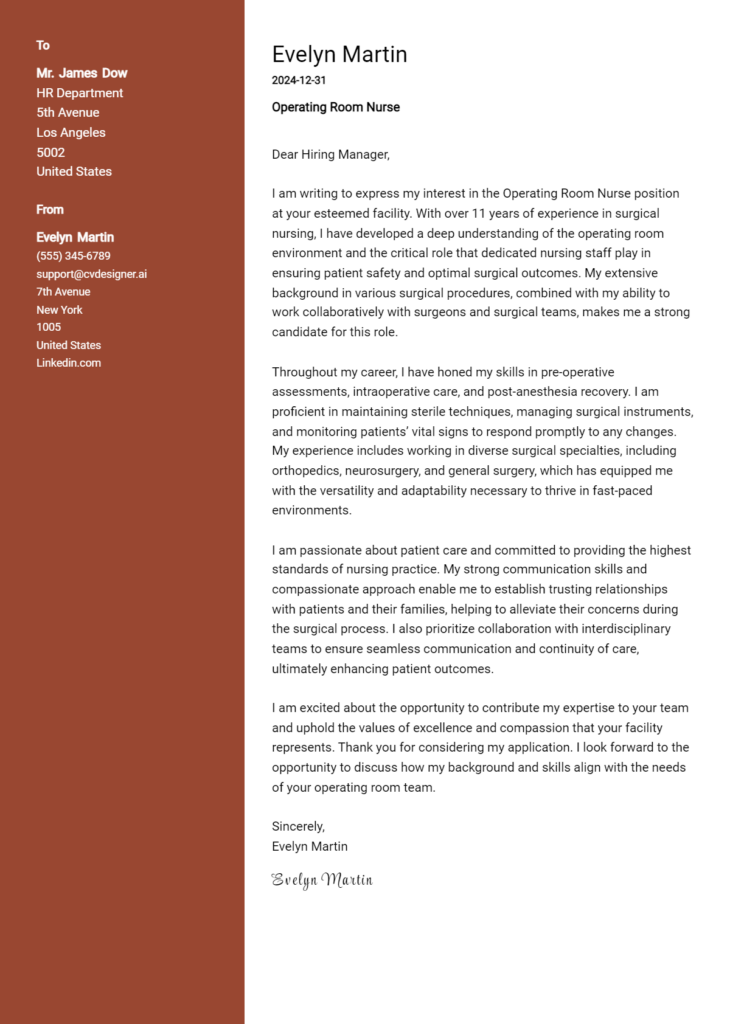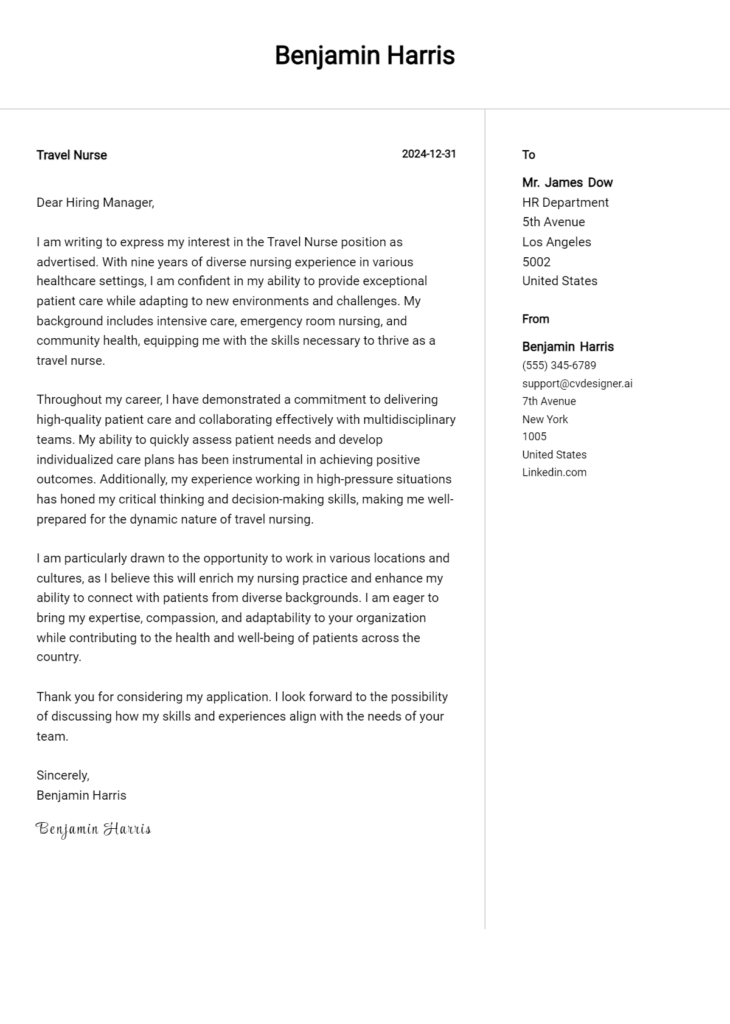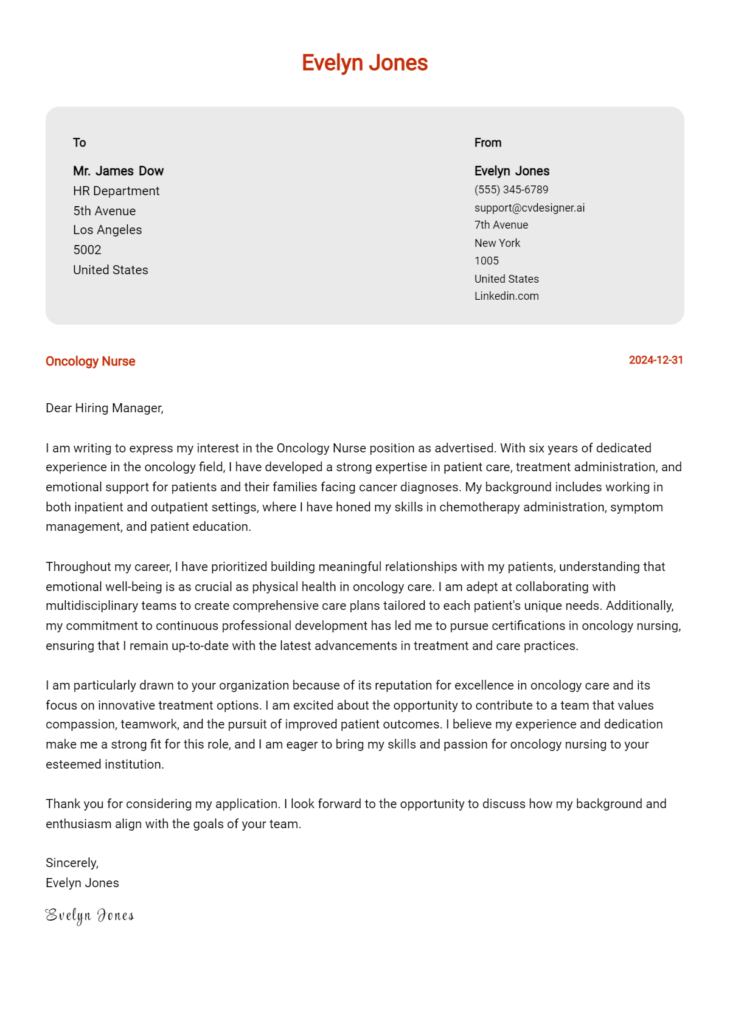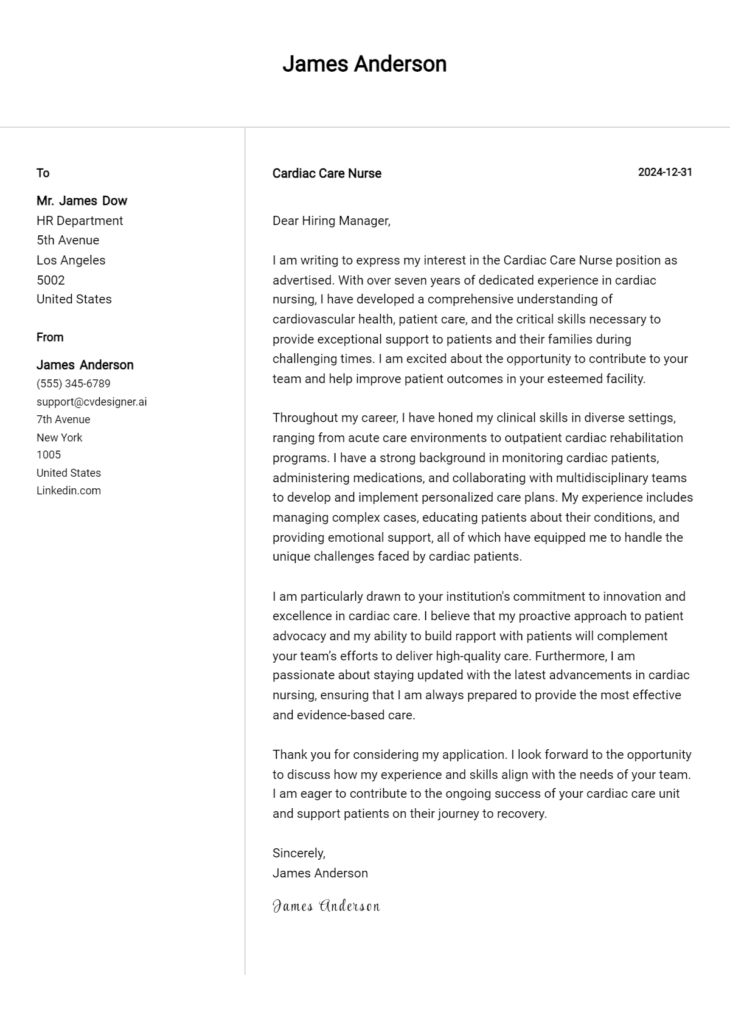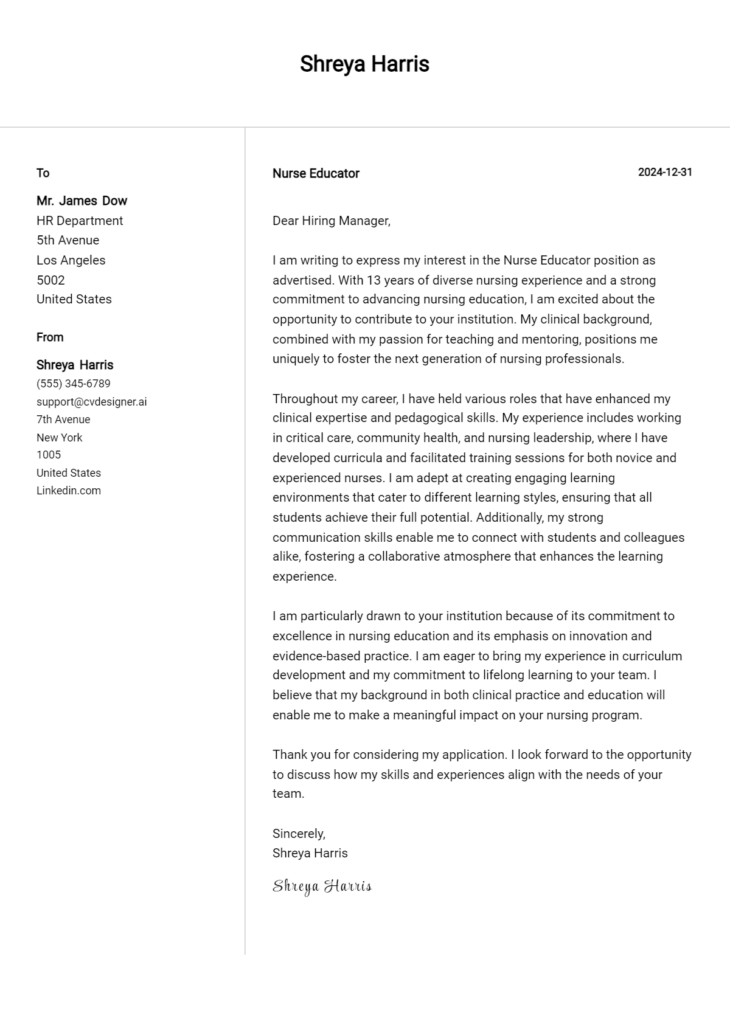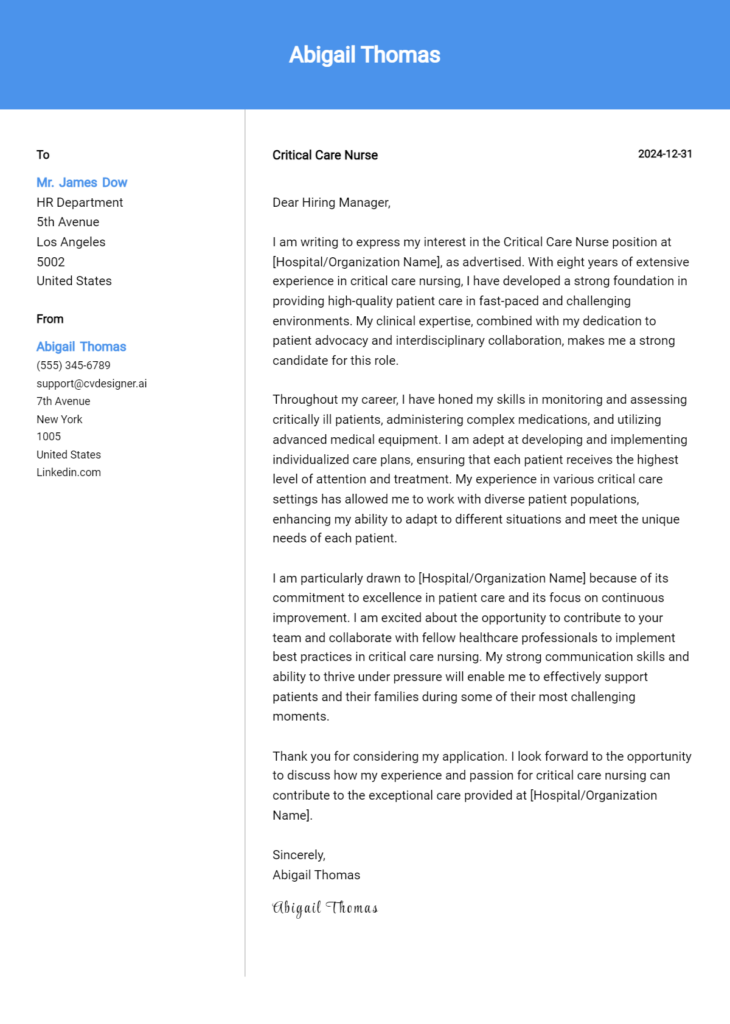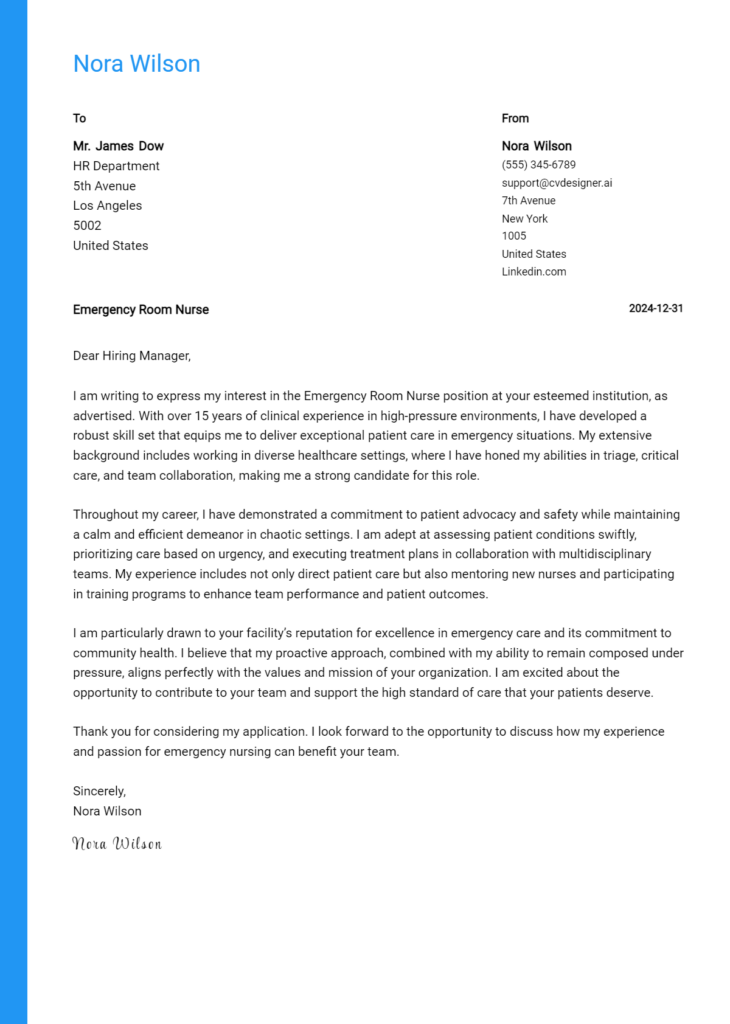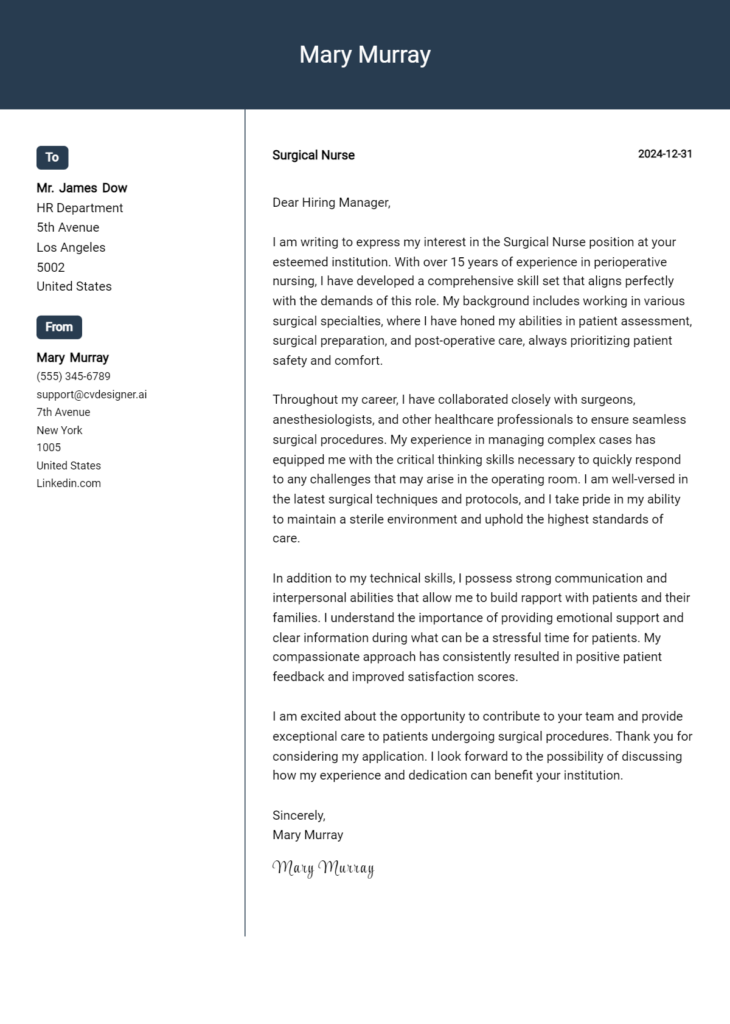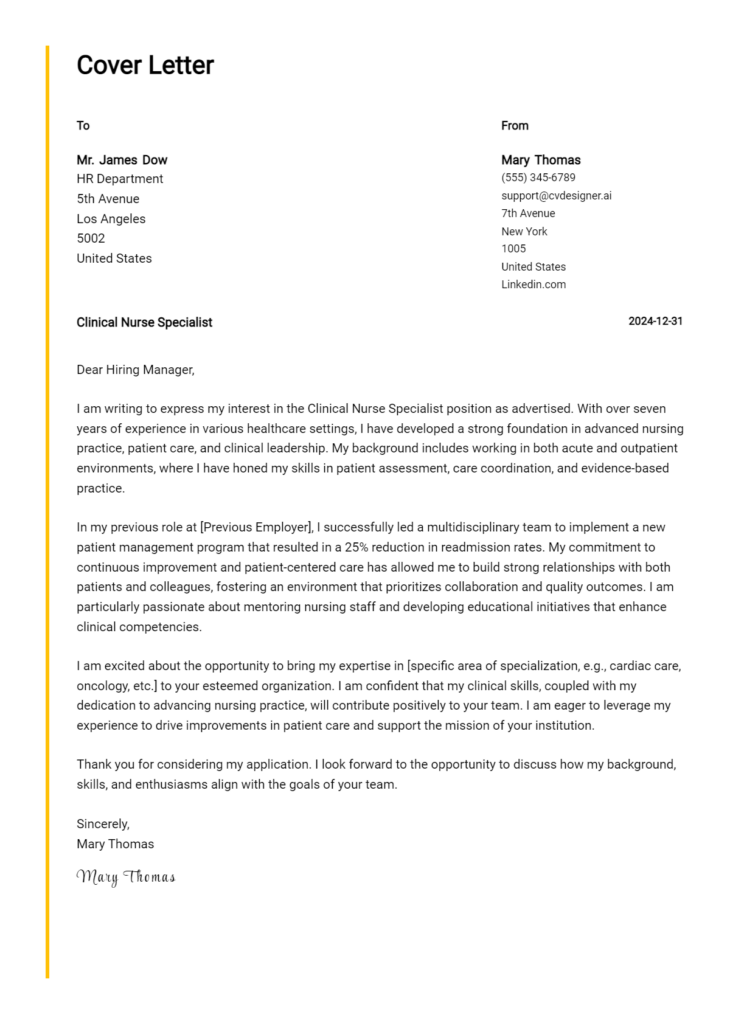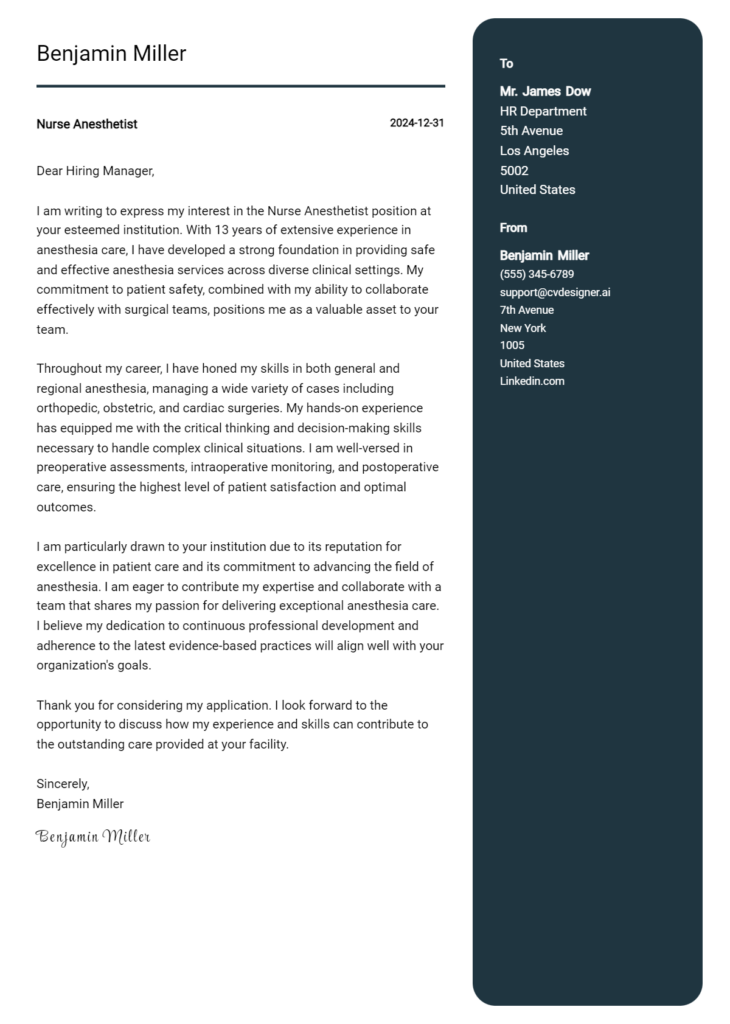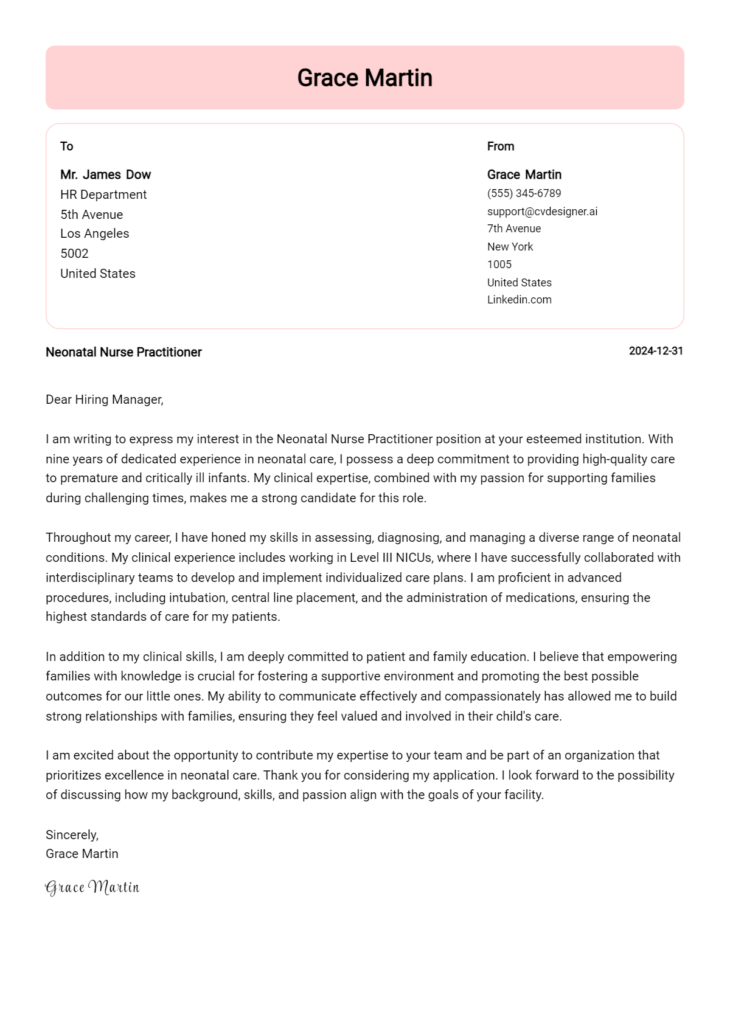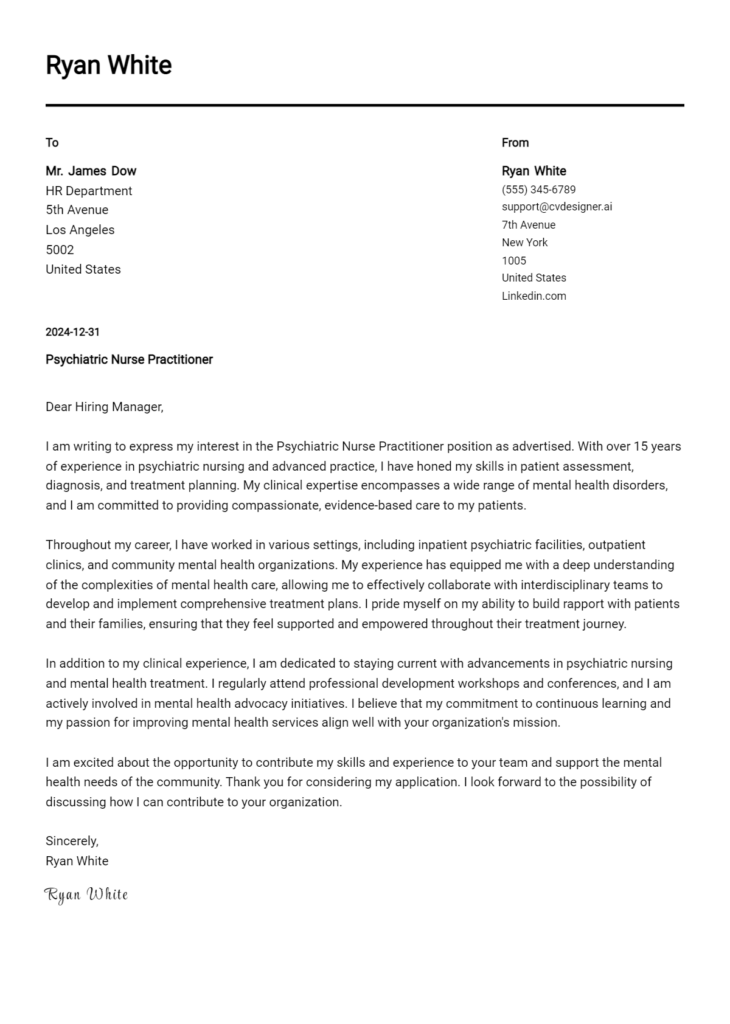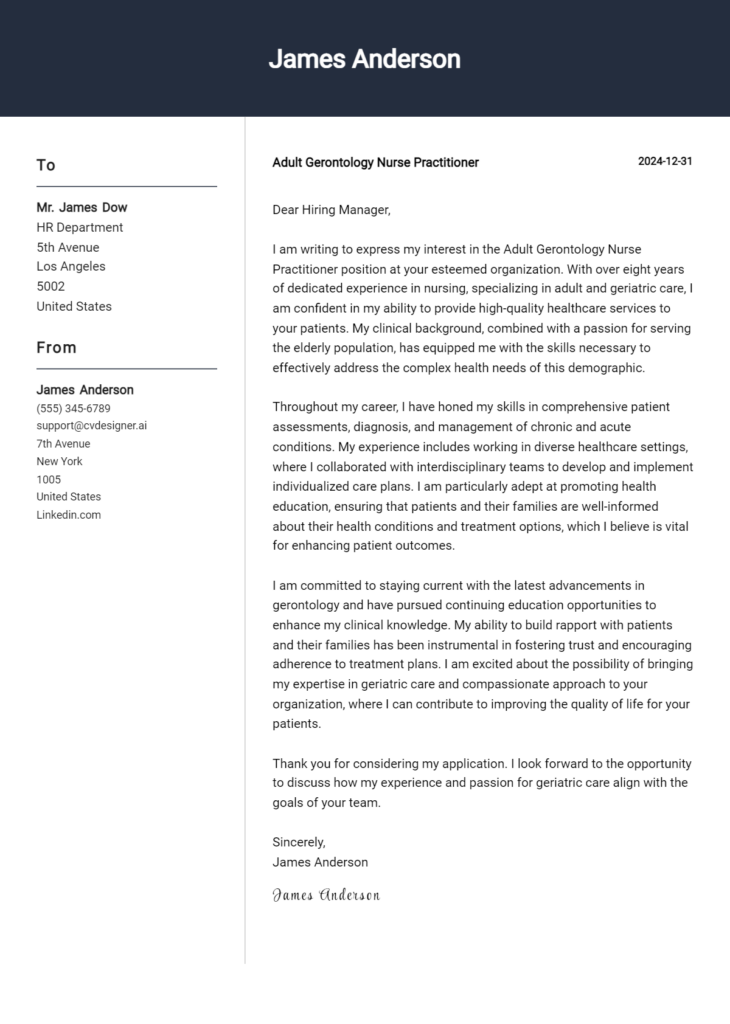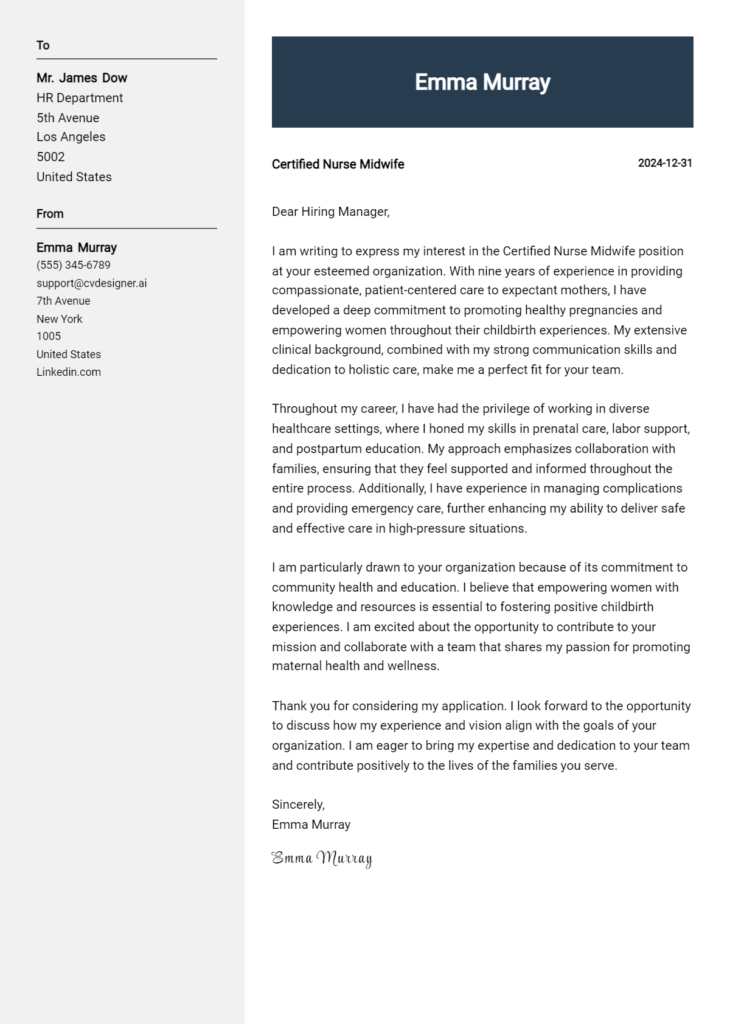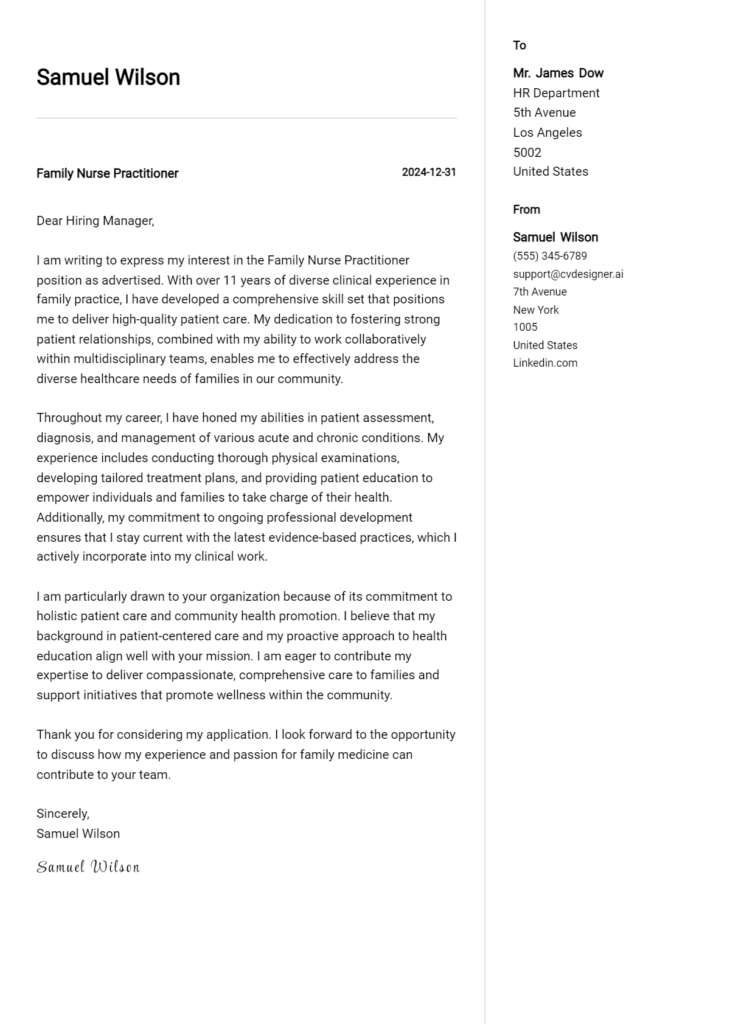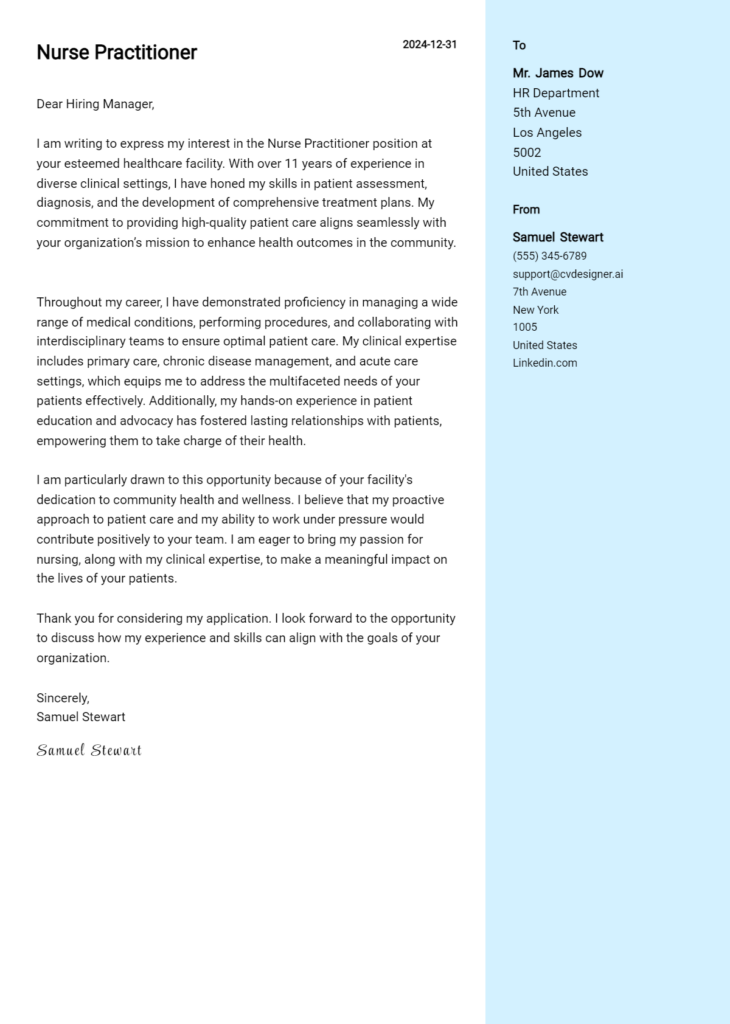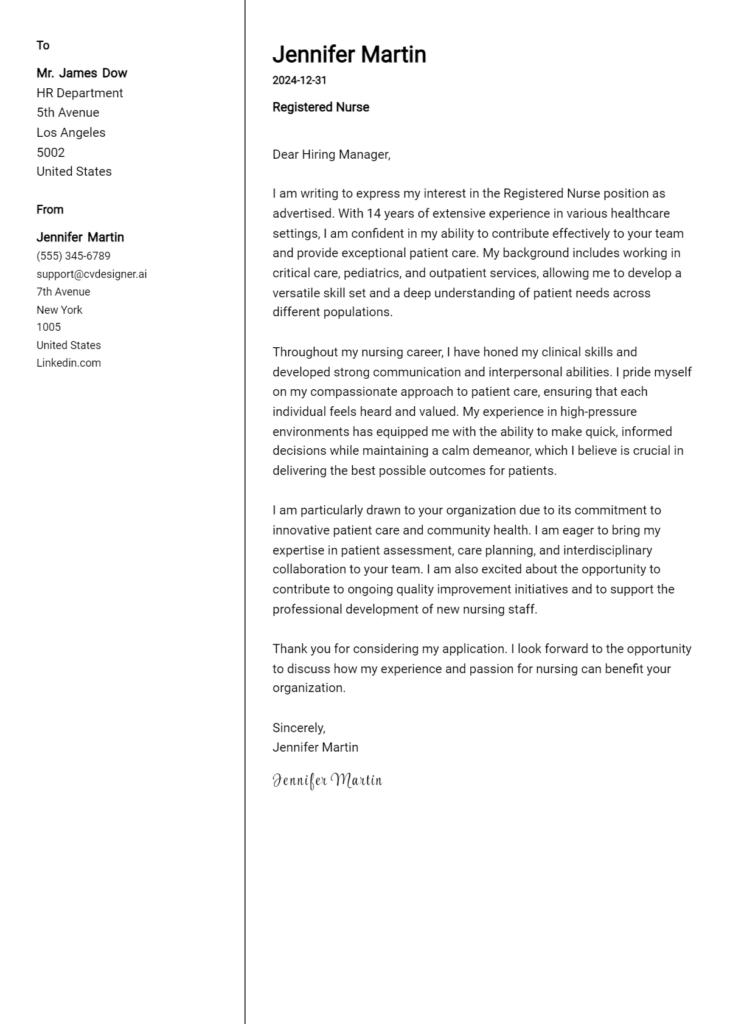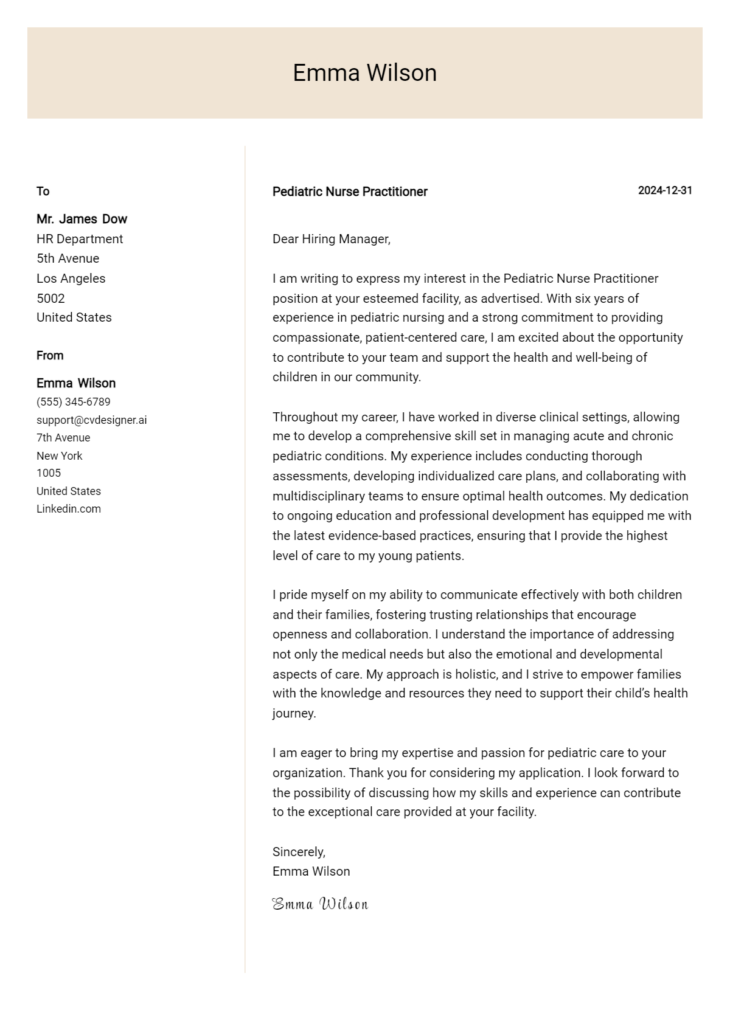Acute Care Nurse Practitioner Cover Letter Examples
Explore additional Acute Care Nurse Practitioner cover letter samples and guides and see what works for your level of experience or role.
How to Format an Acute Care Nurse Practitioner Cover Letter
Crafting a compelling cover letter is essential for an Acute Care Nurse Practitioner, as it serves as your first opportunity to make a lasting impression on potential employers. The way you format your cover letter reflects your professionalism, attention to detail, and understanding of the healthcare environment. A well-structured cover letter not only highlights your clinical skills and experience but also demonstrates your ability to communicate effectively—an essential trait in the fast-paced world of acute care nursing.
In this guide, we will outline the key components of a professional cover letter, providing insights and nurse practitioner-specific examples to help you create a standout document.
We will focus on the essential elements of a cover letter, including:
- Cover Letter Header
- Cover Letter Greeting
- Cover Letter Introduction
- Cover Letter Body
- Cover Letter Closing
Each section plays a critical role in showcasing your qualifications and commitment to patient care. Let’s break down each part and discuss how to make your Acute Care Nurse Practitioner cover letter shine.
Importance of the Cover Letter Header for an Acute Care Nurse Practitioner
The cover letter header is a crucial component of your application as an Acute Care Nurse Practitioner. It sets the tone for your letter and provides essential information at a glance. A clear and professional header should include your contact information, the date, and the recipient's details. This not only helps in establishing your identity but also demonstrates your attention to detail and organization, which are vital traits in the healthcare profession. A strong header reflects your professionalism and can make a significant impression on potential employers.
Strong Example
Jane Doe, MSN, APRN, ACNP-BC 123 Main St. Anytown, State, ZIP jane.doe@email.com (123) 456-7890 October 1, 2023 Hiring Manager Healthcare Facility Name 456 Elm St. Anytown, State, ZIP
Weak Example
Jane D. 10/1/23 To Whom It May Concern
Importance of the Cover Letter Greeting
The greeting of a cover letter serves as the first impression for the hiring manager, setting the tone for the rest of the correspondence. A well-crafted greeting demonstrates professionalism and adds a personal touch by addressing the recipient directly. This initial engagement can make a significant difference in how the rest of the letter is perceived. To avoid sounding generic, it's crucial to research the hiring manager's name and title when possible. This shows your genuine interest in the position and the organization, allowing you to stand out among other candidates.
Strong and Weak Greeting Examples
Strong Example
Dear Dr. Johnson,
Weak Example
To Whom It May Concern,
The Importance of a Well-Crafted Cover Letter Introduction for an Acute Care Nurse Practitioner
A well-crafted cover letter introduction is crucial for an Acute Care Nurse Practitioner (ACNP) as it serves as the first impression to the hiring manager. This introduction should not only capture their attention but also express genuine interest in the role while briefly showcasing key skills or achievements that align with the job requirements. A strong introduction sets the tone for the rest of the cover letter, encouraging the reader to delve deeper into the candidate's qualifications. Conversely, a weak introduction can leave a lackluster impression, causing the candidate to miss an opportunity. Below are examples of both strong and weak cover letter introductions for an ACNP position.
Strong Example:
Dear [Hiring Manager's Name], As a dedicated and compassionate Acute Care Nurse Practitioner with over five years of experience in fast-paced medical environments, I am excited to apply for the ACNP position at [Hospital/Clinic Name]. My extensive background in critical care, combined with my commitment to patient-centered practice, has equipped me with the skills necessary to deliver exceptional care to patients in high-stress situations. I am particularly drawn to your facility’s innovative approach to patient treatment and would love the opportunity to contribute to your team.
Weak Example:
To Whom It May Concern, I am writing to apply for the Acute Care Nurse Practitioner position. I have some experience in nursing and think I would be a good fit. I am interested in working at your hospital because it seems like a nice place.
Purpose of the Cover Letter Body for an Acute Care Nurse Practitioner
The cover letter body serves as a crucial platform for the Acute Care Nurse Practitioner (ACNP) to articulate their unique qualifications, experiences, and the value they bring to potential employers. It allows candidates to showcase their clinical skills, such as proficiency in emergency procedures, patient management, and interdisciplinary collaboration. By highlighting specific projects or accomplishments, such as leading a quality improvement initiative that reduced patient wait times by 30% or implementing a new protocol that improved patient outcomes in critical care, candidates can effectively demonstrate their impact in previous roles. This section of the cover letter not only reflects the candidate's technical expertise but also their commitment to patient care and their ability to contribute positively to the healthcare team.
Strong Example
Dear Hiring Manager, I am excited to apply for the Acute Care Nurse Practitioner position at XYZ Hospital. In my previous role at ABC Medical Center, I successfully led a quality improvement project aimed at reducing patient wait times in the emergency department. Through data analysis and collaboration with the nursing staff, we implemented a triage protocol that resulted in a 30% decrease in average wait times, significantly enhancing patient satisfaction. Additionally, I managed a diverse patient population, developing individualized care plans that improved outcomes for patients with chronic respiratory conditions. My commitment to evidence-based practice and my ability to work effectively within multidisciplinary teams make me a strong candidate for this role. Sincerely, [Your Name]
Weak Example
Dear Hiring Manager, I want to apply for the Acute Care Nurse Practitioner position. I have worked as a nurse for a few years and have taken care of many patients. I think I would do well in this job because I like helping people. In my last job, I did some things to help patients, but I can't remember all the details. I am a team player and can work with others. I hope to bring my skills to your hospital. Best, [Your Name]
The Importance of a Cover Letter Closing for an Acute Care Nurse Practitioner
A well-crafted closing paragraph in a cover letter is essential for an Acute Care Nurse Practitioner as it serves to summarize qualifications, reinforce enthusiasm for the role, and encourage the reader to take the next step, such as reviewing the resume or scheduling an interview. This final impression can be decisive in prompting action from the hiring manager. A strong closing leaves the reader feeling confident in the candidate's abilities and eagerness, while a weak closing may fail to inspire interest or convey the candidate's suitability for the position.
Strong Example
Thank you for considering my application for the Acute Care Nurse Practitioner position at [Hospital/Clinic Name]. With my extensive experience in acute care settings and my commitment to providing high-quality patient care, I am excited about the opportunity to contribute to your team. I look forward to discussing how my skills and qualifications align with your needs and am eager to explore how I can support your patients and staff. Please feel free to review my attached resume, and I hope to hear from you soon to schedule a convenient time for an interview.
Weak Example
I hope you think about my application. I have experience and I want to be a Nurse Practitioner. Let me know if you want to talk. Thanks.
Crafting an effective cover letter is crucial for candidates aspiring to become an Acute Care Nurse Practitioner. A well-written cover letter not only highlights your qualifications but also provides an opportunity to showcase your technical skills, problem-solving abilities, knowledge of the Software Development Life Cycle (SDLC), teamwork, and passion for continuous learning. The following tips will guide you in creating a compelling cover letter that stands out to employers.
Cover Letter Writing Tips for Acute Care Nurse Practitioner
Highlight Your Technical Skills
Begin your cover letter by emphasizing your technical skills relevant to acute care nursing. Mention specific competencies such as advanced cardiac life support (ACLS), critical care procedures, and electronic health record (EHR) systems that you are proficient in. Tailor this section to match the job description, ensuring that you align your skills with the needs of the healthcare facility.Demonstrate Problem-Solving Abilities
Acute care nurses often face complex situations that require quick thinking and effective decision-making. Use your cover letter to illustrate instances where you successfully identified problems and implemented solutions. Share specific examples that demonstrate your analytical skills and ability to remain calm under pressure, as this will resonate well with potential employers.Showcase Your Knowledge of SDLC
While primarily associated with software development, knowledge of the Software Development Life Cycle (SDLC) can be beneficial in a healthcare context, especially when discussing data management and patient care technologies. If you have experience working with health informatics or implementing new technologies in patient care, make sure to mention this in your cover letter. It shows that you are not only technically savvy but also aware of the evolving healthcare landscape.Emphasize Teamwork and Collaboration
Acute care nursing is a team-oriented profession, so it’s essential to highlight your ability to work collaboratively with other healthcare professionals. Discuss experiences where you played a key role in a multidisciplinary team, emphasizing your communication skills and your commitment to providing high-quality patient care. This will demonstrate to employers that you are a team player who contributes positively to the workplace culture.Express Your Passion for Continuous Learning
The field of healthcare is always evolving, and continuous learning is vital for success. Use your cover letter to convey your commitment to professional development. Mention any additional certifications, ongoing education, or special training you have pursued. This not only shows your dedication to your profession but also reassures employers that you will stay current with best practices and advancements in acute care nursing.
By implementing these tips, you can create a powerful cover letter that highlights your qualifications and sets you apart as an Acute Care Nurse Practitioner candidate. For more guidance, check out various cover letter templates or use a cover letter builder to streamline the writing process.
Common Mistakes to Avoid in an Acute Care Nurse Practitioner Cover Letter
Avoiding common mistakes in your cover letter is crucial for success as an Acute Care Nurse Practitioner. A well-crafted cover letter can make a significant difference in standing out to potential employers. Here are some common pitfalls to watch out for:
Generic Salutations: Addressing the letter to "To Whom It May Concern" can signal a lack of effort. Instead, find out the hiring manager's name for a personal touch.
Repetition of Your Resume: Your cover letter should complement your resume, not repeat it. Use this opportunity to highlight specific experiences and how they relate to the job.
Neglecting the Job Description: Failing to tailor your cover letter to the specific job can make you seem unqualified. Carefully read the job description and incorporate relevant keywords and skills.
Poor Formatting: A cluttered or unprofessional layout can detract from your message. Follow a clear cover letter format to ensure readability.
Lack of Enthusiasm: A cover letter that lacks passion can come off as uninspired. Convey your excitement about the position and the organization.
Spelling and Grammar Errors: Typos can create a negative impression. Always proofread your letter and consider asking a colleague to review it.
Ignoring the Closing: A weak conclusion may leave the reader unimpressed. End with a strong closing statement that expresses your eagerness to discuss your qualifications further.
By avoiding these mistakes, you can create a compelling cover letter that showcases your qualifications for the Acute Care Nurse Practitioner role. For inspiration, check out some cover letter examples that can guide you in crafting your own.
Cover Letter FAQs for Acute Care Nurse Practitioner
What should I include in my cover letter for an Acute Care Nurse Practitioner position?
In your cover letter, start by introducing yourself and expressing your enthusiasm for the Acute Care Nurse Practitioner role. Highlight your relevant education, certifications, and clinical experiences. Discuss specific skills, such as advanced assessment, diagnostic reasoning, and treatment planning. Include examples of how you’ve successfully managed acute care situations and collaborated with interdisciplinary teams. It’s also important to align your values with the organization’s mission. Conclude with a strong closing statement expressing your eagerness for an interview and your availability.
How can I make my cover letter stand out?
To make your cover letter stand out, personalize it for the specific job and organization. Research the institution’s values and customize your letter accordingly. Use specific examples from your clinical practice to illustrate your competencies and achievements, such as successful patient outcomes or innovative care strategies. Additionally, use a professional yet engaging tone, and avoid generic phrases. Consider incorporating keywords from the job description to demonstrate that you meet their requirements. A polished format and error-free writing also contribute to a standout application.
How long should my cover letter be?
Your cover letter should ideally be one page long, consisting of three to four paragraphs. Aim for a length of 250-400 words. This length allows you to provide enough detail about your qualifications and experiences without overwhelming the reader. Focus on clarity and conciseness; each sentence should add value to your application. Use short paragraphs and bullet points if necessary to improve readability. Remember, hiring managers often have limited time to review applications, so make your points clear and to the point.
Should I include my salary expectations in the cover letter?
Generally, it’s best to avoid discussing salary expectations in your cover letter unless the job posting specifically requests this information. Instead, focus on showcasing your skills, experiences, and what you can bring to the organization. If the topic arises during a later stage of the hiring process, you can discuss salary in more detail. However, if you feel strongly about including a salary range, do so in a way that emphasizes your flexibility and willingness to negotiate based on the role’s responsibilities and the organization’s budget.
Build your Cover Letter in minutes
Use an AI-powered cover letter builder and have your letter done in 5 minutes. Just select your template and our software will guide you through the process.

